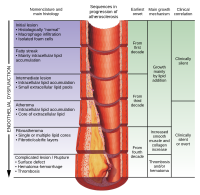
Photo from wikipedia
We aimed to explore the association of a traditional Mediterranean diet (MD) with risk of first hospitalization for heart failure (HF) or atrial fibrillation (AF) in a population-based cohort from… Click to show full abstract
We aimed to explore the association of a traditional Mediterranean diet (MD) with risk of first hospitalization for heart failure (HF) or atrial fibrillation (AF) in a population-based cohort from a southern Italian region. Longitudinal analysis on 20,598 men and women (aged≥35 y) free from HF, AF and cardiovascular disease recruited in the Moli-sani Study (2005-2010). First hospital admissions for HF or AF were recorded by direct linkage with hospital discharge form registry. Dietary data were collected by the EPIC food frequency questionnaire, adherence to MD was appraised by the Greek Mediterranean diet score (MDS ranging 0-9). Hazard ratios (HR) with 95% confidence interval (95%CI) were calculated by multivariable Cox-regression. Over a median follow up of 8.2 y, we ascertained 661 HF events and 337 AF cases. A 2-point increase in the MDS was associated with a downward trend in the risk of developing HF (HR = 0.94;0.85-1.04) after adjustment for potential confounders, while no association was found with risk of AF (HR = 1.07;0.94-1.21). Analyses run separately by gender revealed that higher adherence to an MD was associated with lower risk of HF among women (HF = 0.83;0.72-0.95 for 2-point increase in the MDS) but not in men (HR = 1.07;0.93-1.22; p for interaction=0.011). No gender-related difference was observed for AF risk (p for interaction=0.62). Among women, higher intake of monounsaturated over saturated fats was associated with 38% (20% to 52%) lower risk of HF, while in men moderate alcohol intake was likely to reduce HF risk (HR = 0.87;0.70-1.08). Closer adherence to a traditional MD is associated with lower risk of first hospitalization for HF among women but not in men. No association was found with risk of AF. A traditional MD reduces the risk of HF in women but not in men. Minor dietary changes inspired to a traditional MD could be valuable primary prevention measures for risk of HF.
Journal Title: European Journal of Public Health
Year Published: 2019
Link to full text (if available)
Share on Social Media: Sign Up to like & get
recommendations!